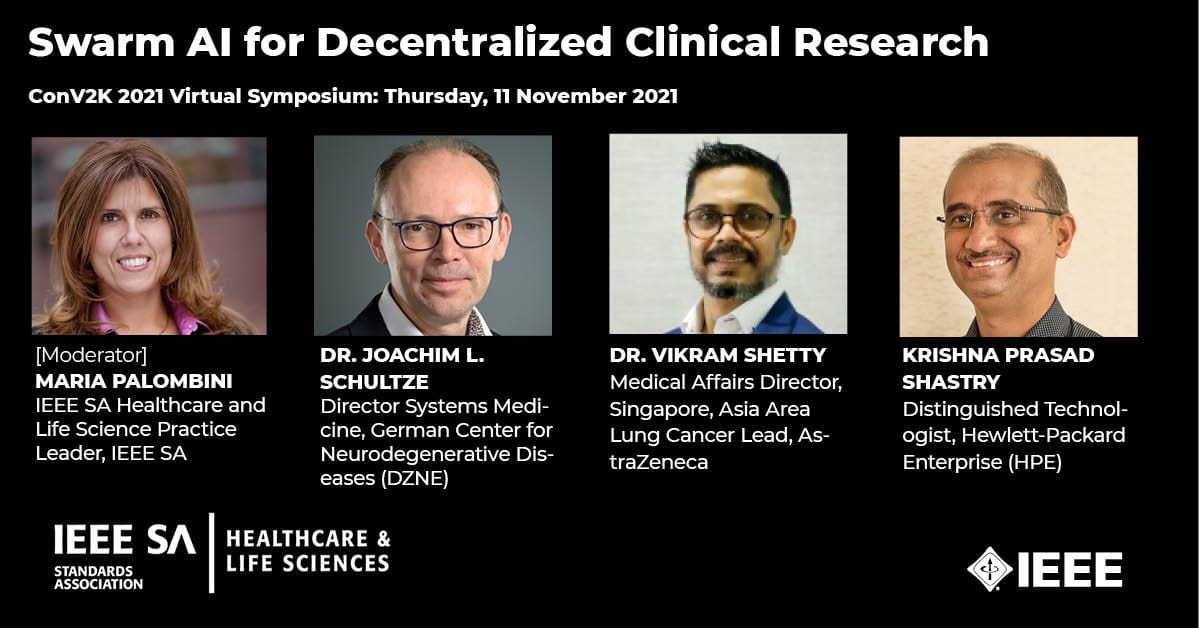If the term “swarm” naturally makes you think of swarms of honey bees or ants, you are on the right path to understanding the concept. Swarm AI (artificial swarm intelligence) is an emerging application inspired on the social behavioral models of insects such as bees, ants, etc.
What is Swarm AI?
Swarm Learning is defined as a decentralized machine-learning approach that unites edge computing, blockchain-based peer-to-peer networking and coordination while maintaining confidentiality without the need for a central coordinator, thereby going beyond federated learning.1
To eliminate any confusion:
- Swarm AI is not the same as federated machine learning (FML). FML requires a centralized server that coordinates the participant nodes whereas Swarm AI is completely decentralized.
- Swarm AI is not the same as crowd-sourcing AI in that Swarm AI draws conclusions on combined insights and intuition versus aggregating general insights and opinions.
The IEEE SA Healthcare and Life Science Practice is hosting a cutting-edge panel session on 11 November at the ConV2X 2021 Virtual Symposium on technical and clinical considerations, as well as opportunities of utilizing Swarm AI for advancing decentralized clinical research and precision medicine.

Swarm Learning opens doors to new opportunities for collaboration and innovation in clinical research while maintaining patient privacy and no centralized repository. It fulfills the requirements of data protection in a natural way where all members of the swarm have equal rights.
Only algorithms and parameters are shared – essentially the insights are shared with no central authority over what happens. Swarm creates many new opportunities in clinical research for development of new therapeutics, in epidemiology, genetics research, and more. The potential of this technology does not go unchecked with some challenges yet to be resolved.
In the course of the panel session, the expert panelists will address three main points:
- The technical, policy, and application barriers when it relates to transferring significant amounts of patient data.
- New applications and potentials for precision medicine that Swarm AI can offer in the drug development process.
- The requirements to drive understanding and wider adoption of the technology in clinical R&D.
“There has to be a change in mindset. Now, it will be much easier in medicine, if you have equal partners and they basically decide together what is being done…We need to decide together how to work together on each individual’s data without having to share it; we need to just share the insights. That is the new way of openness in science, it’s not open data, now it’s open insight.”
– Dr. Joachim Schultze, Founding Director of Systems Medicine, the German Center for Neurodegenerative Diseases (DZNE)
Swarm AI is prime for use in healthcare research and precision medicine. No one hospital can “own” or process the amount of patient health data to reach the scale of what Swarm AI can do.
Furthermore, the critical element of Swarm AI is that it is not applying to raw data but rather to learned practices and insights. Essentially, all researchers of a common research interest can participate and benefit without having to share the raw patient data. There are many advantages to Swarm AI including scalability, adaptability, confidentiality, decentralization, flexibility, and more.
In the pursuit of identifying and diagnosing lung cancer with its various phenotypes across diverse populations, it requires a significant amount of data for the algorithm to produce a meaningful outcome at the end of it, to better predict relapse and offer more precise responsive treatments.
“In order to have better outcomes, we need to have that large set of data. However, we cannot get access to all that big data because of privacy policies and proprietary rights. Maintaining holds on data will probably not work for human good unless we have that ability to share that data in a very collaborative manner, while maintaining our integrity and respecting the patient’s right to privacy.”
– Dr. Vikram Shetty, Medical Affairs Director, Singapore; Asia Area Lung Cancer Lead, AstraZeneca
Swarm AI offers many benefits and opportunities to leverage shared learnings and practices. However, there are challenges with the technology that cannot go unchecked. The application is highly sensitive – a small change in a simple rule or change in agent behavior can significantly change the outcome. And it has no central control which could impact safety and utility. These are considerable ethical and technical considerations that continue to be researched, refined as there is more use of the application.
“We [HPE] primarily use a blockchain to build a good peer to peer fault tolerant network. The private permission blockchain network ensures that only the authorized participant can join the network and participate. Further, smart contracts are used, which provides a trusted execution to coordinate among the other nodes to elect a leader or a coordinator, thereby eliminating any central custodian. Utilizing the smart contract feature to implement the merging logic, this basically prevents a participating member with malintent or somebody who breaks into the network from steering the training (of the data) in the wrong direction. By trying to attack the operations on the model, the merging algorithm is implemented via the smart contract which provides the production against the attack.”
– Krishna Prasad Shastry, Distinguished Technologist, Hewlett-Packard Enterprise (HPE)
Special thanks to our expert panelists who not only dedicate their time to find tools to better enhance patient care but who also share their insights with the global community to open the doors to better healthcare.
If you want to hear the full conversation, join this session to find out the growing interest and applications for Swarm AI in decentralized clinical R&D.
Subscribe to Win a Free Ticket to Conv2x 2021 Virtual Symposium
We have some full conference complimentary tickets to share with some of our lucky readers. To win this free ticket, subscribe to the IEEE SA Healthcare and Life Sciences Practice Newsletter before 7 November 2021. From 1-7 November, we will have a daily drawing of winners.
Related Resources
- IEEE SA Healthcare and Life Science Practice
- Tech and Data Harmonization for Enabling Decentralized Clinical Trials Industry Connections Program
- Responsible Innovation of AI and the Life Sciences Industry Connections Program
- IEEE 3652.1™-2020 – IEEE Guide for Architectural Framework and Application of Federated Machine Learning
- IEEE P2986™- Recommended Practice for Privacy and Security for Federated Machine Learning
- IEEE P2840™ – Standard for Responsible AI Licensing
- On-Demand Webinar: Swarm Learning for Decentralized and Confidential Clinical Machine Learning
Sources
1 Warnat-Herresthal, S., Schultze, H., Shastry, K.L. et al. Swarm Learning for decentralized and confidential clinical machine learning. Nature 594, 265–270 (2021). https://doi.org/10.1038/s41586-021-03583-3









